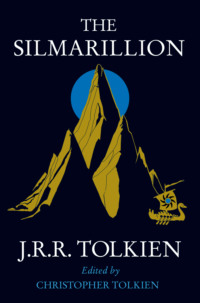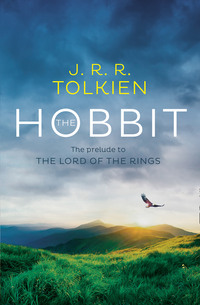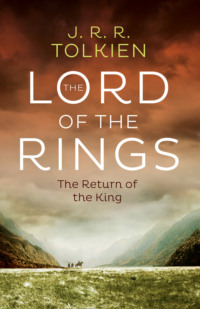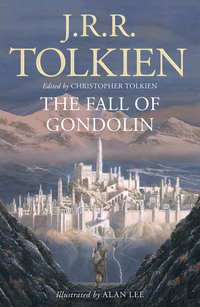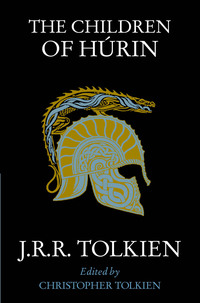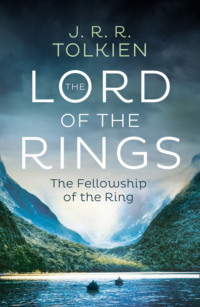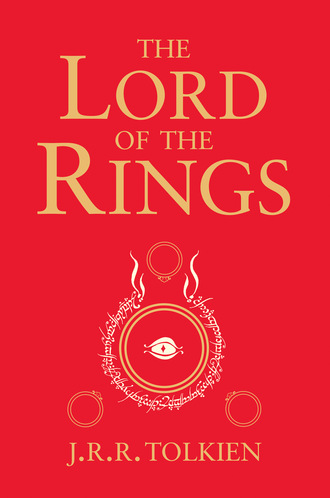
Полная версия
‘This is Goldberry’s washing day,’ he said, ‘and her autumn-cleaning. Too wet for hobbit-folk – let them rest while they are able! It’s a good day for long tales, for questions and for answers, so Tom will start the talking.’
He then told them many remarkable stories, sometimes half as if speaking to himself, sometimes looking at them suddenly with a bright blue eye under his deep brows. Often his voice would turn to song, and he would get out of his chair and dance about. He told them tales of bees and flowers, the ways of trees, and the strange creatures of the Forest, about the evil things and good things, things friendly and things unfriendly, cruel things and kind things, and secrets hidden under brambles.
As they listened, they began to understand the lives of the Forest, apart from themselves, indeed to feel themselves as the strangers where all other things were at home. Moving constantly in and out of his talk was Old Man Willow, and Frodo learned now enough to content him, indeed more than enough, for it was not comfortable lore. Tom’s words laid bare the hearts of trees and their thoughts, which were often dark and strange, and filled with a hatred of things that go free upon the earth, gnawing, biting, breaking, hacking, burning: destroyers and usurpers. It was not called the Old Forest without reason, for it was indeed ancient, a survivor of vast forgotten woods; and in it there lived yet, ageing no quicker than the hills, the fathers of the fathers of trees, remembering times when they were lords. The countless years had filled them with pride and rooted wisdom, and with malice. But none were more dangerous than the Great Willow: his heart was rotten, but his strength was green; and he was cunning, and a master of winds, and his song and thought ran through the woods on both sides of the river. His grey thirsty spirit drew power out of the earth and spread like fine root-threads in the ground, and invisible twig-fingers in the air, till it had under its dominion nearly all the trees of the Forest from the Hedge to the Downs.
Suddenly Tom’s talk left the woods and went leaping up the young stream, over bubbling waterfalls, over pebbles and worn rocks, and among small flowers in close grass and wet crannies, wandering at last up on to the Downs. They heard of the Great Barrows, and the green mounds, and the stone-rings upon the hills and in the hollows among the hills. Sheep were bleating in flocks. Green walls and white walls rose. There were fortresses on the heights. Kings of little kingdoms fought together, and the young Sun shone like fire on the red metal of their new and greedy swords. There was victory and defeat; and towers fell, fortresses were burned, and flames went up into the sky. Gold was piled on the biers of dead kings and queens; and mounds covered them, and the stone doors were shut; and the grass grew over all. Sheep walked for a while biting the grass, but soon the hills were empty again. A shadow came out of dark places far away, and the bones were stirred in the mounds. Barrow-wights walked in the hollow places with a clink of rings on cold fingers, and gold chains in the wind. Stone rings grinned out of the ground like broken teeth in the moonlight.
The hobbits shuddered. Even in the Shire the rumour of the Barrow-wights of the Barrow-downs beyond the Forest had been heard. But it was not a tale that any hobbit liked to listen to, even by a comfortable fireside far away. These four now suddenly remembered what the joy of this house had driven from their minds: the house of Tom Bombadil nestled under the very shoulder of those dreaded hills. They lost the thread of his tale and shifted uneasily, looking aside at one another.
When they caught his words again they found that he had now wandered into strange regions beyond their memory and beyond their waking thought, into times when the world was wider, and the seas flowed straight to the western Shore; and still on and back Tom went singing out into ancient starlight, when only the Elf-sires were awake. Then suddenly he stopped, and they saw that he nodded as if he was falling asleep. The hobbits sat still before him, enchanted; and it seemed as if, under the spell of his words, the wind had gone, and the clouds had dried up, and the day had been withdrawn, and darkness had come from East and West, and all the sky was filled with the light of white stars.
Whether the morning and evening of one day or of many days had passed Frodo could not tell. He did not feel either hungry or tired, only filled with wonder. The stars shone through the window and the silence of the heavens seemed to be round him. He spoke at last out of his wonder and a sudden fear of that silence:
‘Who are you, Master?’ he asked.
‘Eh, what?’ said Tom sitting up, and his eyes glinting in the gloom. ‘Don’t you know my name yet? That’s the only answer. Tell me, who are you, alone, yourself and nameless? But you are young and I am old. Eldest, that’s what I am. Mark my words, my friends: Tom was here before the river and the trees; Tom remembers the first raindrop and the first acorn. He made paths before the Big People, and saw the little People arriving. He was here before the Kings and the graves and the Barrow-wights. When the Elves passed westward, Tom was here already, before the seas were bent. He knew the dark under the stars when it was fearless – before the Dark Lord came from Outside.’
A shadow seemed to pass by the window, and the hobbits glanced hastily through the panes. When they turned again, Goldberry stood in the door behind, framed in light. She held a candle, shielding its flame from the draught with her hand; and the light flowed through it, like sunlight through a white shell.
‘The rain has ended,’ she said; ‘and new waters are running downhill, under the stars. Let us now laugh and be glad!’
‘And let us have food and drink!’ cried Tom. ‘Long tales are thirsty. And long listening’s hungry work, morning, noon, and evening!’ With that he jumped out of his chair, and with a bound took a candle from the chimney-shelf and lit it in the flame that Goldberry held; then he danced about the table. Suddenly he hopped through the door and disappeared.
Quickly he returned, bearing a large and laden tray. Then Tom and Goldberry set the table; and the hobbits sat half in wonder and half in laughter: so fair was the grace of Goldberry and so merry and odd the caperings of Tom. Yet in some fashion they seemed to weave a single dance, neither hindering the other, in and out of the room, and round about the table; and with great speed food and vessels and lights were set in order. The boards blazed with candles, white and yellow. Tom bowed to his guests. ‘Supper is ready,’ said Goldberry; and now the hobbits saw that she was clothed all in silver with a white girdle, and her shoes were like fishes’ mail. But Tom was all in clean blue, blue as rain-washed forget-me-nots, and he had green stockings.
It was a supper even better than before. The hobbits under the spell of Tom’s words may have missed one meal or many, but when the food was before them it seemed at least a week since they had eaten. They did not sing or even speak much for a while, and paid close attention to business. But after a time their hearts and spirits rose high again, and their voices rang out in mirth and laughter.
After they had eaten, Goldberry sang many songs for them, songs that began merrily in the hills and fell softly down into silence; and in the silences they saw in their minds pools and waters wider than any they had known, and looking into them they saw the sky below them and the stars like jewels in the depths. Then once more she wished them each good night and left them by the fireside. But Tom now seemed wide awake and plied them with questions.
He appeared already to know much about them and all their families, and indeed to know much of all the history and doings of the Shire down from days hardly remembered among the hobbits themselves. It no longer surprised them; but he made no secret that he owed his recent knowledge largely to Farmer Maggot, whom he seemed to regard as a person of more importance than they had imagined. ‘There’s earth under his old feet, and clay on his fingers; wisdom in his bones, and both his eyes are open,’ said Tom. It was also clear that Tom had dealings with the Elves, and it seemed that in some fashion, news had reached him from Gildor concerning the flight of Frodo.
Indeed so much did Tom know, and so cunning was his questioning, that Frodo found himself telling him more about Bilbo and his own hopes and fears than he had told before even to Gandalf. Tom wagged his head up and down, and there was a glint in his eyes when he heard of the Riders.
‘Show me the precious Ring!’ he said suddenly in the midst of the story: and Frodo, to his own astonishment, drew out the chain from his pocket, and unfastening the Ring handed it at once to Tom.
It seemed to grow larger as it lay for a moment on his big brown-skinned hand. Then suddenly he put it to his eye and laughed. For a second the hobbits had a vision, both comical and alarming, of his bright blue eye gleaming through a circle of gold. Then Tom put the Ring round the end of his little finger and held it up to the candlelight. For a moment the hobbits noticed nothing strange about this. Then they gasped. There was no sign of Tom disappearing!
Tom laughed again, and then he spun the Ring in the air – and it vanished with a flash. Frodo gave a cry – and Tom leaned forward and handed it back to him with a smile.
Frodo looked at it closely, and rather suspiciously (like one who has lent a trinket to a juggler). It was the same Ring, or looked the same and weighed the same: for that Ring had always seemed to Frodo to weigh strangely heavy in the hand. But something prompted him to make sure. He was perhaps a trifle annoyed with Tom for seeming to make so light of what even Gandalf thought so perilously important. He waited for an opportunity, when the talk was going again, and Tom was telling an absurd story about badgers and their queer ways – then he slipped the Ring on.
Merry turned towards him to say something and gave a start, and checked an exclamation. Frodo was delighted (in a way): it was his own ring all right, for Merry was staring blankly at his chair, and obviously could not see him. He got up and crept quietly away from the fireside towards the outer door.
‘Hey there!’ cried Tom, glancing towards him with a most seeing look in his shining eyes. ‘Hey! Come Frodo, there! Where be you a-going? Old Tom Bombadil’s not as blind as that yet. Take off your golden ring! Your hand’s more fair without it. Come back! Leave your game and sit down beside me! We must talk a while more, and think about the morning. Tom must teach the right road, and keep your feet from wandering.’
Frodo laughed (trying to feel pleased), and taking off the Ring he came and sat down again. Tom now told them that he reckoned the Sun would shine tomorrow, and it would be a glad morning, and setting out would be hopeful. But they would do well to start early; for weather in that country was a thing that even Tom could not be sure of for long, and it would change sometimes quicker than he could change his jacket. ‘I am no weather-master,’ said he; ‘nor is aught that goes on two legs.’
By his advice they decided to make nearly due North from his house, over the western and lower slopes of the Downs: they might hope in that way to strike the East Road in a day’s journey, and avoid the Barrows. He told them not to be afraid – but to mind their own business.
‘Keep to the green grass. Don’t you go a-meddling with old stone or cold Wights or prying in their houses, unless you be strong folk with hearts that never falter!’ He said this more than once; and he advised them to pass barrows by on the west-side, if they chanced to stray near one. Then he taught them a rhyme to sing, if they should by ill-luck fall into any danger or difficulty the next day.
Ho! Tom Bombadil, Tom Bombadillo!
By water, wood and hill, by the reed and willow,
By fire, sun and moon, harken now and hear us!
Come, Tom Bombadil, for our need is near us!
When they had sung this altogether after him, he clapped them each on the shoulder with a laugh, and taking candles led them back to their bedroom.
Chapter 8
FOG ON THE BARROW-DOWNS
That night they heard no noises. But either in his dreams or out of them, he could not tell which, Frodo heard a sweet singing running in his mind: a song that seemed to come like a pale light behind a grey rain-curtain, and growing stronger to turn the veil all to glass and silver, until at last it was rolled back, and a far green country opened before him under a swift sunrise.
The vision melted into waking; and there was Tom whistling like a tree-full of birds; and the sun was already slanting down the hill and through the open window. Outside everything was green and pale gold.
After breakfast, which they again ate alone, they made ready to say farewell, as nearly heavy of heart as was possible on such a morning: cool, bright, and clean under a washed autumn sky of thin blue. The air came fresh from the North-west. Their quiet ponies were almost frisky, sniffing and moving restlessly. Tom came out of the house and waved his hat and danced upon the doorstep, bidding the hobbits to get up and be off and go with good speed.
They rode off along a path that wound away from behind the house, and went slanting up towards the north end of the hill-brow under which it sheltered. They had just dismounted to lead their ponies up the last steep slope, when suddenly Frodo stopped.
‘Goldberry!’ he cried. ‘My fair lady, clad all in silver green! We have never said farewell to her, nor seen her since the evening!’ He was so distressed that he turned back; but at that moment a clear call came rippling down. There on the hill-brow she stood beckoning to them: her hair was flying loose, and as it caught the sun it shone and shimmered. A light like the glint of water on dewy grass flashed from under her feet as she danced.
They hastened up the last slope, and stood breathless beside her. They bowed, but with a wave of her arm she bade them look round; and they looked out from the hill-top over lands under the morning. It was now as clear and far-seen as it had been veiled and misty when they stood upon the knoll in the Forest, which could now be seen rising pale and green out of the dark trees in the West. In that direction the land rose in wooded ridges, green, yellow, russet under the sun, beyond which lay hidden the valley of the Brandywine. To the South, over the line of the Withywindle, there was a distant glint like pale glass where the Brandywine River made a great loop in the lowlands and flowed away out of the knowledge of the hobbits. Northward beyond the dwindling downs the land ran away in flats and swellings of grey and green and pale earth-colours, until it faded into a featureless and shadowy distance. Eastward the Barrow-downs rose, ridge behind ridge into the morning, and vanished out of eyesight into a guess: it was no more than a guess of blue and a remote white glimmer blending with the hem of the sky, but it spoke to them, out of memory and old tales, of the high and distant mountains.
They took a deep draught of the air, and felt that a skip and a few stout strides would bear them wherever they wished. It seemed fainthearted to go jogging aside over the crumpled skirts of the downs towards the Road, when they should be leaping, as lusty as Tom, over the stepping stones of the hills straight towards the Mountains.
Goldberry spoke to them and recalled their eyes and thoughts. ‘Speed now, fair guests!’ she said. ‘And hold to your purpose! North with the wind in the left eye and a blessing on your footsteps! Make haste while the Sun shines!’ And to Frodo she said: ‘Farewell, Elf-friend, it was a merry meeting!’
But Frodo found no words to answer. He bowed low, and mounted his pony, and followed by his friends jogged slowly down the gentle slope behind the hill. Tom Bombadil’s house and the valley, and the Forest were lost to view. The air grew warmer between the green walls of hillside and hillside, and the scent of turf rose strong and sweet as they breathed. Turning back, when they reached the bottom of the green hollow, they saw Goldberry, now small and slender like a sunlit flower against the sky: she was standing still watching them, and her hands were stretched out towards them. As they looked she gave a clear call, and lifting up her hand she turned and vanished behind the hill.
Their way wound along the floor of the hollow, and round the green feet of a steep hill into another deeper and broader valley, and then over the shoulders of further hills, and down their long limbs, and up their smooth sides again, up on to new hill-tops and down into new valleys. There was no tree nor any visible water: it was a country of grass and short springy turf, silent except for the whisper of the air over the edges of the land, and high lonely cries of strange birds. As they journeyed the sun mounted, and grew hot. Each time they climbed a ridge the breeze seemed to have grown less. When they caught a glimpse of the country westward the distant Forest seemed to be smoking, as if the fallen rain was steaming up again from leaf and root and mould. A shadow now lay round the edge of sight, a dark haze above which the upper sky was like a blue cap, hot and heavy.
About mid-day they came to a hill whose top was wide and flattened, like a shallow saucer with a green mounded rim. Inside there was no air stirring, and the sky seemed near their heads. They rode across and looked northwards. Then their hearts rose; for it seemed plain that they had come further already than they had expected. Certainly the distances had now all become hazy and deceptive, but there could be no doubt that the Downs were coming to an end. A long valley lay below them winding away northwards, until it came to an opening between two steep shoulders. Beyond, there seemed to be no more hills. Due north they faintly glimpsed a long dark line. ‘That is a line of trees,’ said Merry, ‘and that must mark the Road. All along it for many leagues east of the Bridge there are trees growing. Some say they were planted in the old days.’
‘Splendid!’ said Frodo. ‘If we make as good going this afternoon as we have done this morning, we shall have left the Downs before the Sun sets and be jogging on in search of a camping place.’ But even as he spoke he turned his glance eastwards, and he saw that on that side the hills were higher and looked down upon them; and all those hills were crowned with green mounds, and on some were standing stones, pointing upwards like jagged teeth out of green gums.
That view was somehow disquieting; so they turned from the sight and went down into the hollow circle. In the midst of it there stood a single stone, standing tall under the sun above, and at this hour casting no shadow. It was shapeless and yet significant: like a landmark, or a guarding finger, or more like a warning. But they were now hungry, and the sun was still at the fearless noon; so they set their backs against the east side of the stone. It was cool, as if the sun had had no power to warm it; but at that time this seemed pleasant. There they took food and drink, and made as good a noon-meal under the open sky as anyone could wish; for the food came from ‘down under Hill’. Tom had provided them with plenty for the comfort of the day. Their ponies unburdened strayed upon the grass.
Riding over the hills, and eating their fill, the warm sun and the scent of turf, lying a little too long, stretching out their legs and looking at the sky above their noses: these things are, perhaps, enough to explain what happened. However that may be: they woke suddenly and uncomfortably from a sleep they had never meant to take. The standing stone was cold, and it cast a long pale shadow that stretched eastward over them. The sun, a pale and watery yellow, was gleaming through the mist just above the west wall of the hollow in which they lay; north, south, and east, beyond the wall the fog was thick, cold and white. The air was silent, heavy and chill. Their ponies were standing crowded together with their heads down.
The hobbits sprang to their feet in alarm, and ran to the western rim. They found that they were upon an island in the fog. Even as they looked out in dismay towards the setting sun, it sank before their eyes into a white sea, and a cold grey shadow sprang up in the East behind. The fog rolled up to the walls and rose above them, and as it mounted it bent over their heads until it became a roof: they were shut in a hall of mist whose central pillar was the standing stone.
They felt as if a trap was closing about them; but they did not quite lose heart. They still remembered the hopeful view they had had of the line of the Road ahead, and they still knew in which direction it lay. In any case, they now had so great a dislike for that hollow place about the stone that no thought of remaining there was in their minds. They packed up as quickly as their chilled fingers would work.
Soon they were leading their ponies in single file over the rim and down the long northward slope of the hill, down into a foggy sea. As they went down the mist became colder and damper, and their hair hung lank and dripping on their foreheads. When they reached the bottom it was so chill that they halted and got out cloaks and hoods, which soon became bedewed with grey drops. Then, mounting their ponies, they went slowly on again, feeling their way by the rise and fall of the ground. They were steering, as well as they could guess, for the gate-like opening at the far northward end of the long valley which they had seen in the morning. Once they were through the gap, they had only to keep on in anything like a straight line and they were bound in the end to strike the Road. Their thoughts did not go beyond that, except for a vague hope that perhaps away beyond the Downs there might be no fog.
Their going was very slow. To prevent their getting separated and wandering in different directions they went in file, with Frodo leading. Sam was behind him, and after him came Pippin, and then Merry. The valley seemed to stretch on endlessly. Suddenly Frodo saw a hopeful sign. On either side ahead a darkness began to loom through the mist; and he guessed that they were at last approaching the gap in the hills, the north-gate of the Barrow-downs. If they could pass that, they would be free.
‘Come on! Follow me!’ he called back over his shoulder, and he hurried forward. But his hope soon changed to bewilderment and alarm. The dark patches grew darker, but they shrank; and suddenly he saw, towering ominous before him and leaning slightly towards one another like the pillars of a headless door, two huge standing stones. He could not remember having seen any sign of these in the valley, when he looked out from the hill in the morning. He had passed between them almost before he was aware: and even as he did so darkness seemed to fall round him. His pony reared and snorted, and he fell off. When he looked back he found that he was alone: the others had not followed him.
‘Sam!’ he called. ‘Pippin! Merry! Come along! Why don’t you keep up?’
There was no answer. Fear took him, and he ran back past the stones shouting wildly: ‘Sam! Sam! Merry! Pippin!’ The pony bolted into the mist and vanished. From some way off, or so it seemed, he thought he heard a cry: ‘Hoy! Frodo! Hoy!’ It was away eastward, on his left as he stood under the great stones, staring and straining into the gloom. He plunged off in the direction of the call, and found himself going steeply uphill.
As he struggled on he called again, and kept on calling more and more frantically; but he heard no answer for some time, and then it seemed faint and far ahead and high above him. ‘Frodo! Hoy!’ came the thin voices out of the mist: and then a cry that sounded like help, help! often repeated, ending with a last help! that trailed off into a long wail suddenly cut short. He stumbled forward with all the speed he could towards the cries; but the light was now gone, and clinging night had closed about him, so that it was impossible to be sure of any direction. He seemed all the time to be climbing up and up.


